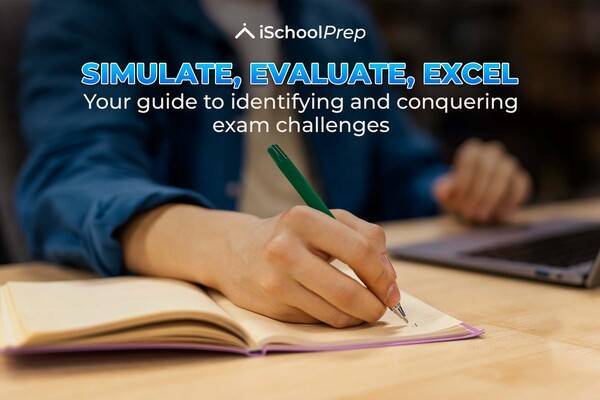Table of Contents
Simulated tests | An overview
In today’s competitive academic and professional world, simulated tests have emerged as a crucial tool for success. These assessments, mirroring real-world scenarios, equip individuals with the necessary skills and knowledge to excel in their fields. They bridge the gap between theoretical learning and practical application, ensuring that learners are not only well-versed in their subjects but also adept at applying their knowledge in real-life situations.
The importance of simulated tests lies in their ability to provide a realistic, risk-free environment for skill enhancement, making them indispensable in modern education and professional training.
Importance of simulated tests in education
Simulated tests in education serve an important role in giving students a practical grasp of exam conditions, thereby increasing their readiness and minimizing anxiety. They also provide vital feedback, assisting students in identifying and improving their areas of weakness prior to taking official tests.
Bridging theory and practice
Simulated tests serve as a crucial bridge between theoretical knowledge and practical application. They replicate real-world scenarios in a controlled environment, allowing learners to apply theoretical concepts and hone their skills without the risk associated with real-life situations. This method of assessment is particularly beneficial in fields like medicine, where hands-on experience is vital.
Enhancing learning outcomes
Research indicates that simulation-based learning significantly improves knowledge retention, decision-making skills, and technical proficiency. By providing a realistic yet safe platform for practice, simulated tests enable learners to experiment, make mistakes, and learn from them, thereby enhancing their overall competence.
Features of simulation-based assessment

Simulation-based assessment, a technique that has revolutionized learning and training across various disciplines, stands out for its unique features that replicate real-world experiences in a controlled environment. This approach has been particularly transformative in fields such as healthcare, aviation, and military training, where the stakes are high and precision is paramount.
Immersive learning environments
One of the key features of simulation-based assessment is its immersive nature. These simulations are designed to create environments that closely mimic real-life scenarios, allowing trainees to experience and interact with situations that are as close to reality as possible.
For instance, in medical training, full-body mannequin simulators, which originated in the field of anesthesia, have evolved to include advanced features like computerized physiological responses. These simulators enable medical professionals to practice complex procedures and make critical decisions in a risk-free setting.
Integration of technology and realism
The integration of advanced technology in simulation-based learning is another significant feature. This technology ranges from simple computer-based scenarios to complex virtual reality setups.
In healthcare, for instance, these technologies allow for the simulation of a wide range of medical conditions and emergencies. The use of electronic medical records in simulations adds another layer of realism, preparing learners for the digital aspects of modern healthcare practice.
Focus on teamwork and communication
Simulation-based assessments also emphasize the development of teamwork and communication skills, especially in multidisciplinary fields. In healthcare, for example, simulations are used to train teams in effectively managing emergency situations, where coordination and communication are as critical as clinical skills. These simulations often include debriefing sessions, where teams can analyze their performance, discuss improvements, and learn from their experiences.
Customization and flexibility
Another notable feature of simulation-based assessments is their ability to be customized according to the specific learning objectives and skill levels of participants. Scenarios can be designed to target particular competencies, from basic procedural skills to complex decision-making and problem-solving abilities. This flexibility ensures that simulations are relevant and challenging for learners at all stages of their professional development.
Safety and risk management
Safety is a paramount concern in high-stakes professions, and simulation-based learning provides a safe environment for practice. It allows learners to make mistakes and learn from them without the risk of real-life consequences. This aspect is crucial in fields like medicine, where patient safety is the top priority. Simulations enable healthcare professionals to practice and master procedures before performing them on actual patients, thus reducing the likelihood of errors.
Measurable outcomes and feedback
Simulation-based assessments are designed to provide measurable outcomes, which are critical for evaluating the effectiveness of training. These outcomes can include performance metrics, skill acquisition levels, and decision-making capabilities. The provision of immediate feedback is an integral part of these simulations, allowing learners to understand their strengths and areas for improvement.
Benefits of simulation-based assessment in professional development

Simulation-based assessment in professional development allows for realistic, hands-on experience in a controlled environment, enhancing practical skills and decision-making abilities. It also provides immediate feedback, enabling learners to reflect on and improve their performance in real-time, fostering continuous professional growth.
Enhancing professional competencies
Simulation-based assessments are pivotal in the realm of professional development, particularly in fields characterized by rapid technological advancements and evolving best practices. These simulations are not merely theoretical exercises; they are sophisticated, immersive experiences that replicate real-world scenarios. This allows professionals to refine their skills in a dynamic and interactive environment.
In healthcare, for instance, simulation-based learning has become an integral part of medical education and ongoing professional training. According to a study published in the Journal of Emergency Trauma Shock, simulation techniques in medical training have evolved significantly, offering more realistic and complex scenarios. These simulations are not just about mastering procedures; they also encompass decision-making, ethical considerations, and handling of practical dilemmas.
For example, full-body mannequin simulators, which originated in the field of anesthesia, have now been adopted across various medical disciplines, allowing for a more comprehensive training experience that includes both technical skills and patient interaction.
Building teamwork and communication skills
Beyond individual skill enhancement, simulation-based learning is instrumental in developing critical soft skills such as teamwork and communication. In high-stakes environments like healthcare and emergency services, the ability to work effectively as a team can be crucial. Simulation provides a controlled setting where teams can practice and refine these skills without the risk of real-world consequences.
Simulation training helps bridge the gap between different healthcare disciplines, fostering a better understanding of each other’s roles and responsibilities. This collaborative approach is essential for patient safety and effective healthcare delivery.
Simulation-based training also addresses the challenge of communication in high-pressure situations. For instance, in emergency medicine, where quick decision-making and clear communication are vital, simulation exercises help teams develop these skills in a realistic yet safe environment. The training often includes debriefing sessions, where teams can reflect on their performance, receive feedback, and learn from their experiences.
Embracing simulation-based learning for future success
The exploration of simulated tests and their multifaceted applications across different fields underscores their indispensable role in modern education and professional development. From healthcare to engineering, the implementation of simulation-based assessments has revolutionized the way skills and knowledge are acquired and applied.
These simulated environments not only enhance technical proficiency but also foster critical soft skills like teamwork and communication, which are crucial in today’s collaborative work environments.
The importance of simulated tests lies not just in their ability to replicate real-world scenarios but also in their capacity to provide a safe, controlled setting for learners to make mistakes, learn, and improve. This aspect is particularly vital in high-stakes fields like medicine, where the margin for error is minimal, and the consequences of mistakes can be significant.
Moreover, the adaptability of simulation-based learning to cater to various levels of expertise (from novices to seasoned professionals) makes it a versatile and effective educational tool. It supports continuous learning and professional growth, ensuring that individuals are well-equipped to meet the challenges of their respective fields.
Key takeaways
- Simulation-based learning significantly improves knowledge retention, decision-making skills, and technical proficiency.
- Regular exposure to simulated scenarios keeps professionals updated with the latest techniques and practices in their field.
- Simulations provide a platform for professionals to develop and refine their teamwork and communication skills, essential in collaborative work environments.
- Suitable for both novices and experienced professionals, simulated tests offer a versatile approach to learning and skill enhancement.
- They allow learners to make mistakes and learn in a risk-free setting, which is vital in high-stakes industries.
- With technological advancements, the scope for more immersive and effective simulated learning experiences is expanding.
Discover how iSchoolPrep can transform your study abroad experience with their expert guidance. From finding the perfect university to crafting an impressive statement of purpose (SOP), we are your partner in your journey of studying abroad. Start your educational journey today with iSchoolPrep and step into a world of endless possibilities!
Liked this article? Read next: Studying abroad in the digital age: Utilizing technology for learning
FAQs
How do simulated tests enhance learning in medical education?
In medical education, simulated tests allow students and professionals to practice complex medical procedures in a risk-free environment, enhancing their technical skills and decision-making abilities.
Can simulation-based learning be used for professional development?
Yes, simulation-based learning is crucial for professional development as it helps individuals stay current with the latest techniques and practices in their field, ensuring their skills remain relevant and up-to-date.
What are the benefits of simulation-based learning in teamwork development?
Simulation-based learning is instrumental in developing teamwork and communication skills. It provides a safe space for teams to practice coordination, communication, and collaborative problem-solving, which are essential in many professional settings.







Wow, awesome weblog format! How long have you been running a blog
for? you make running a blog look easy. The overall
look of your web site is wonderful, let alone the content material!
You can see similar: https://ricardos.shop and here https://ricardos.shop
At this time it looks like Expression Engine is the best blogging
platform out there right now. (from what I’ve
read) Is that what you’re using on your blog? I saw similar here:
ecommerce and also here: sklep online
Have a look at my web page: e-commerce
Great article. I’m going through many of these issues as well..
I saw similar here: dobry sklep and also here: dobry sklep
Here is my web-site: sklep internetowy